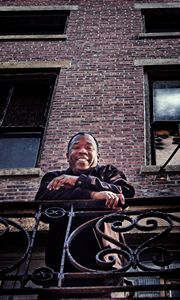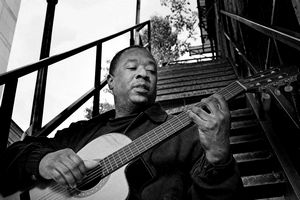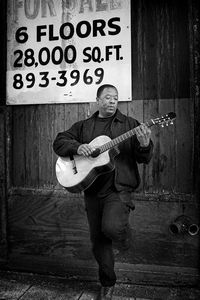social bookmarking tools:
 |
|
| Available RSS Feeds |
|---|
 - Top Picks - Top Picks |
 - Today's Music - Today's Music |
 - Editor's Blog - Editor's Blog
|
 - Articles - Articles
|
Add Louisville Music News' RSS Feed to Your Yahoo!
|
TYRONE COTTON:
THE COMFORT OF COTTON:
In a Dream. . .
You're sitting alone in a theater. Empty seats surround you like rows of rounded gray teeth. The theater is old. The ceiling above you has splotches of water stain. In the center is the base of what used to hold a massive chandelier. Its ornate curlicues and details have been painted over to where it now looks like a slab of lumpy pizza dough. The center hole has been plastered closed. The musty odor from the fabric on the seats and the smell of dampness reminds you of the root cellar of a country home you once visited. The one where you backed into the web of a fiddler spider that dropped under your collar and had you cavorting around like a drunken dervish as you tried to shake it out of your clothes. Antibiotics and hot compresses took care of the quarter-sized lump the little bastard caused after she took a hefty chomp on top of your butt. You had to sit down at an angle for a month.
You squirm at the memory. The stage in front of you is lighted by five white globes that hang from the fly loft far above the floor. Center stage is a three-legged stood and a microphone. A piano sits catty-cornered at stage right with no one behind it. So far no one has needed an accompanist.
You check the clipboard. It's the second day of auditions for the show you're trying to put together. And if you have to hear another solipsistic protest song with vague metaphors that are supposed to represent a pot bust, you'll want to beat the guy with his own guitar. The names on your list are familiar, guys you'd heard before in the coffeehouse and club circuit: some Irishman named Morrison, a guy named Dylan who claimed he has a following in the Village, a skinny, soft-spoken young black man named Cooke, an unshaven dude with hair that looked like he'd combed it with a pencil and a voice that sounded like he gargled rusty razor blades. Said his name was Waits. A young man named Redding needed to rush through this audition. Late for a plane, he'd claimed. Several others, too. Some trying too hard, others not trying hard enough, others who seemed to be reading their song lyrics off the stage floor.
You hear footsteps on the stage. "Excuse me," a voice calls out. You look up. Standing on stage is a guy wearing black trousers, black t-shirt and a black fleece jacket. His right hand grips the handle of a black guitar case. Great, you think. Someone else from the Angst Coffeehouse circuit wearing the clothes he'll probably say reflects his view of the world. You peer closer at him. Nope. No beret.
"Are these auditions open," he asks.
You check the clipboard again. Next one isn't supposed to arrive for another half an hour.
"No," you reply, "but I've got an open slot right now. Let's hear what you've got."
The man removes his guitar, plucks a few strings for tuning, then slides onto the stool. He leans into the microphone and speaks. "Hear me okay?"
His voice is actually soft but burnished with a rasp. Like someone's elderly grandfather getting ready to tell a bedtime story. You nod. He begins to play.
First thing you notice is his right hand, fingerpicking out a gentle melody line. He concentrates on the fretboard. He runs his fingers up for a quick chord change. The mic picks up the squeak the strings make. Then his fingers slide back down. The sounds coming from the guy's guitar are hypnotic and mellow. Most of the ones you'd heard earlier banged out loud open chords as if they were strumming out danger and a warning.
Then he starts to sing. His melody doesn't exactly match what his guitar plays, but they fit. Seamlessly. His voice: a tenor that reaches into upper registers and floats back down again, the rasp adding the flavor of an old blues singer. You feel relaxed, like you could melt into the seat cushion. But then you'd just be another damp stain on it.
You blink yourself out of relaxation and look again at your list. The guy on stage has a soulful croon like Cooke and Redding, has the gritty rasp of the derelict-looking guy Waits and he glides over his own melodies like Dylan and Morrison: hard to sing with, but why would you want to? The guy on stage is handling it just fine by himself.
You wave your clipboard at him. "Okay, thanks. You can stop now."
The man stops and slides off the stool. He turns to put his guitar back in its case. Easy to tell it is a routine he's done many times.
You hear the hollow bumps of his guitar body against the side of its case. You look at your list again. You have room for three acts. You've just found them all in one guy.
"What's your name?"
He stops before closing his case and turns back to the microphone.
"Cotton," he says. "Tyrone Cotton."
In Reality. . .
Hands folded on the table, Tyrone Cotton nodded. "I'd love to sing Dylan songs," he says. "I could see myself maybe doing a Van Morrison tune. I could see doing some blues tunes. I could see doing a Tom Waits. I could also see myself doing a Los Lobos kind of thing." We were at a small restaurant in Old Louisville, discussing the critical comparisons his second self-titled release has received.
To be sure, it is far too easy to make comparisons of one performer to another, to say: "Well, his music's kind of like the folky stuff of pre-Revolver Beatles mixed in with a little Red Hot Chili Peppers when George Clinton was producing them and a rhythm that's kind of like Dick Dale surf rock, the kind he played after the music of his they used in Pulp Fiction made him a star again." If someone has no idea of what pre-Revolver Beatles sounded like or confuses Clintons ("Wasn't he Bill's brother?") or has never seen a frame of Pulp Fiction, then using those comparisons is a waste of words.
However, people who know music generally can tell you what Dylan sounds like (in all phases of his career), or Morrison (Van, that is), likewise Otis Redding and maybe even David Gray. Reviews posted on the web site for In Room One, the artist development company and record label started by Louisville musician and producer Danny Kiley, on which Cotton's latest release appears, do rank his sound with those singers. Not just for an easy way to describe Cotton's sound, but because he is an amalgam of those talents, as both a singer and a songwriter.
And the common element among the compositions from those performers? Their songs say something. As do the kinds of songs Cotton likes, too.
"As a listener," he says, "I look for something that grabs me in some kind of way. Something that has my attention, which could be any number of things. It could be a groove, really nice words, maybe it's saying something. I love listening to great players, too. And not those who just play: those who are saying something when they're playing. It's not just about chops.
"Some are just great musical conversationalists. I always find that interesting."
Conversations done as music can often seem one-sided. The songwriter's or performer's skill comes in involving the audience, either live or listening at home. If the performer's half of the conversation isn't working, the result can be a "You suck!" called out from the back of the room, or the CD can be put back in its jewel case and never played again ("You suck!" in a more passive version). The keys to making sure the conversation is two-way are various, from a riveting vocal style, to song hooks that latch on and burrow deeply, to instrumentation that welcomes or even challenges the ears.
And sometimes the performer himself is the best judge of that for his own work.
"I'm hoping there's something in it that grabs me at least," Cotton said of his songs. "If I really like it, maybe someone else will like it. I know that sometimes if I'm playing music and I'm enjoying it, I think it comes across, whether it's lyrically or something about harmony or the changes."
A graduate of Louisville's Eastern High School, Cotton attended Western Kentucky University ("got my horizons broadened," Cotton said with a giggle) where he studied classical guitar and graduated with a B.A. in music performance.
Then he went to Boston. "I came back to Louisville for a week, then I was gone," he said.
While working with mentally handicapped adults during the day, his nights were spent immersed in Boston's substantial music scene, mostly at a jazz club called Wally's.
"That's where I first fell in love with jazz," he recalled. "It blew me away. It completely had me enthralled."
A quick sampling of the music on his recent CD shows how enthralled he was: the mellow plucking on "Breaking Away," the Mardi Gras bop energy of "As Befits a Man," the smoky upright bass riff that opens his cover of the Los Lobos song "This Time," and throughout it all vocals that skate across the melody line like an improvised sax solo. So add Miles Davis or John Medeski to the roster of sounds-likes for Tyrone Cotton.
But in 1990, Cotton returned to Louisville. Why? Two words: "The rent," he said with a huge laugh.
The expense of living in a major city in the Northeast can be brutal on musicians just starting out. Cotton returned home wiser after having been steeped in Boston's jazz scene.
"I started going over to the Rudyard Kipling," he said, "and I started playing out with a few people. Hitting the scene pretty good. I was in a few bands, doing the reggae thing."
After spending time with regular gigs around the city, Cotton recorded his first CD in the mid 1990s. It featured tracks recorded with jazz guitarist Ron Hayden and solo tracks with just Cotton and his guitar.
From his classical training, Cotton had developed a challenging playing style. "I think my whole eclectic guitar thing when I'd play out," he said, "fingerpicking with the right hand in the classical guitar style to play blues. I'd have this soft tone against the voice. It had a different effect. There was something about using the arpeggios with the strumming. It's something that had carried over from Western when I'd play at the Rud. And now playing with a band, it takes on a style that Danny captured the essence of."
The Danny to whom Cotton referred is Danny Kiley, the Louisville bassist who has played with several bands and solo performers in town, including L'Woo, Serpent Wisdom and Kathleen Hoye and is also producer of Cotton's newest CD.
"I guess when you get into playing with other people like this," Cotton said, "you have to think about your pace. Doing the whole right hand thing, sometimes I had to be conscious and not fill up too much space when there are other people playing to make the music work. I just didn't want to sound too busy. It wouldn't sound right."
Cotton's current CD project began like many others: a series of gigs with other musicians that somehow found a structure and a direction.
"Danny and I would play together and do a few gigs," Cotton said. "Then we just kind of got more involved. We decided he was going to produce some recordings. At first it wasn't necessarily going to be a whole CD, but things rolled along."
Recorded in Louisville and Nashville, Tyrone Cotton (a redux version of sorts of his mid-90s release) features Cotton's mellow fingerpicking style and earnest songwriting, all supported with work from several of the city's stalwart musicians (otherwise known as "The Usual Suspects"), including bassist Kiley, guitarists Tim Krekel and Mark "Lupe" Hamilton, drummers Paul Culligan and Tom Hambridge, saxophonist Ried Jahn and keyboardist Pete Petersen. With the exception of covers of songs originally performed by the Rolling Stones ("Sweet Virginia"), Bob Dylan ("Most of the Time") and Los Lobos (a sultry version of "This Time"), all the songs are Cotton's. But he had some help with the lyrics of two songs: "As Befits a Man," set to a poem by Langston Hughes and "Evening Song," from a work by Jean Toomer.
"Oh, yeah," he says with a big smile when discussing "As Befits." "I'm a huge Langston Hughes fan. Read many of his works, his short stories and travel books. He was very much influenced by music. And a lot of times he wrote those poems to rhythm of music."
The poem itself is sort of a combination funeral plan and male fantasy. "I don't mind dyin'," it states, "but I'd hate to die all alone. . .I want a dozen pretty women to holler, cry and moan" and "a row of long tall mamas fainting, fanning and crying." It's what will probably happen whenever Hugh Hefner heads off to the Big Mansion. And it is appropriate that Cotton does the song in the style of music a New Orleans funeral band plays after the body has been laid to rest and the mourners dance back into the city.
"I think it's funny," Cotton said of the poem. "It's got some other kind of layer to it. It kind of laughs and cries at the same time."
With its laughing, crying and crooning, the 2006 version of Tyrone Cotton has already gotten airplay at several college stations and adult album alternative markets in the U.S. It is also getting played on stations in France, Belgium and Germany and Cotton and Kiley have both recently played gigs together in Japan.
Tyrone Cotton's music and the style in which he performs it, now being heard around the globe, is a hybrid of familiar sounds, like the ones from performers like Bob Dylan or Van Morrison. Which is not to say that Cotton's sound lacks originality or is as derivative as a bad sitcom spin-off. We can get comfortable with Cotton's sound and that comfort breaks down any barricades we put up. We know what we can expect, in sound and theme, from the moment he sings his first note.
Put another way, from a different poem by Langston Hughes:
"Though you may hear me holler / And you may see me cry / I'll be dogged sweet baby / If you gonna see me die / Life is fine! Fine as wine! Life is fine!"
Get comfortable at www.tyronecotton.com.



